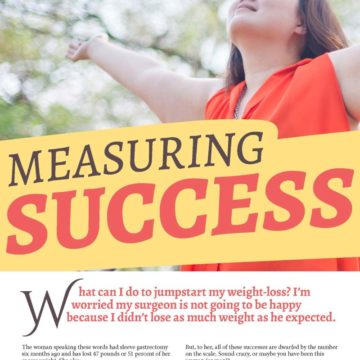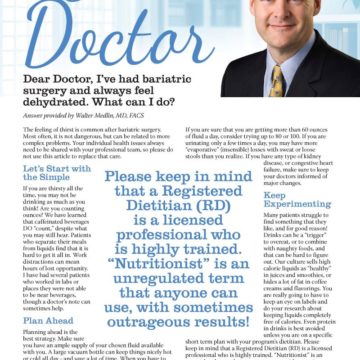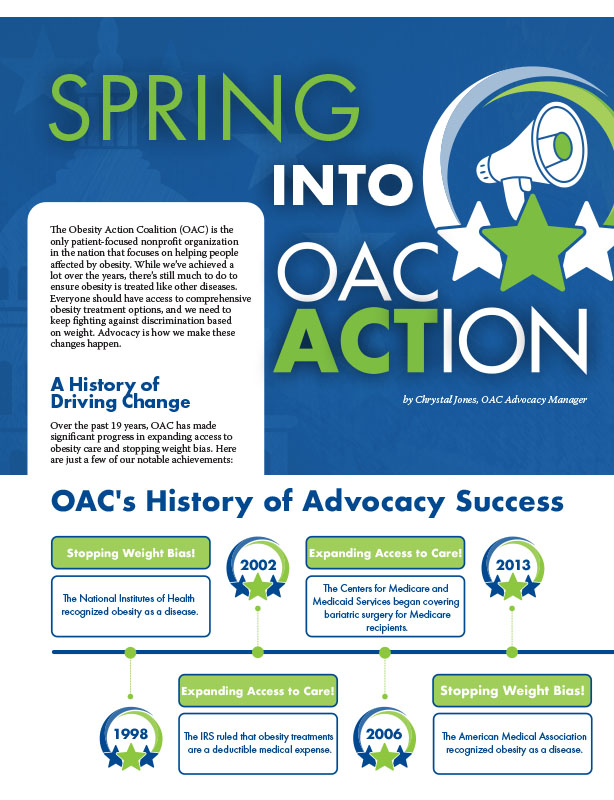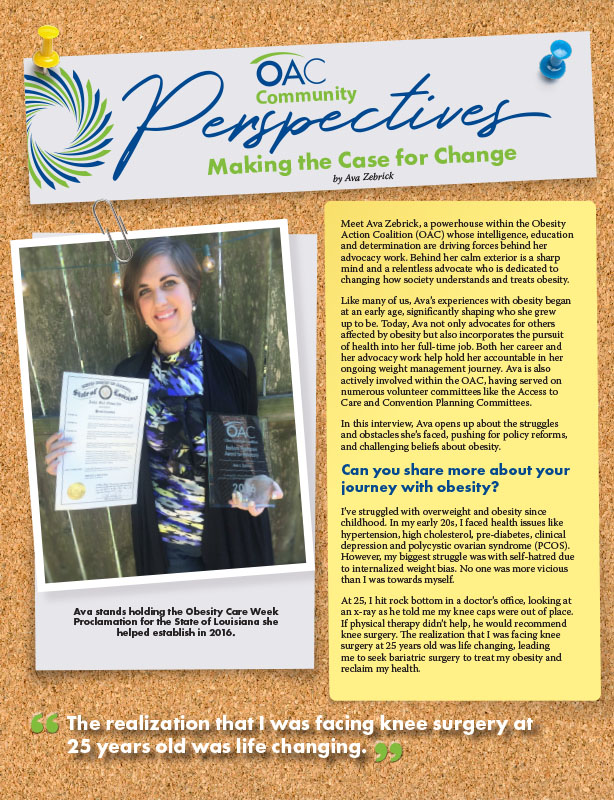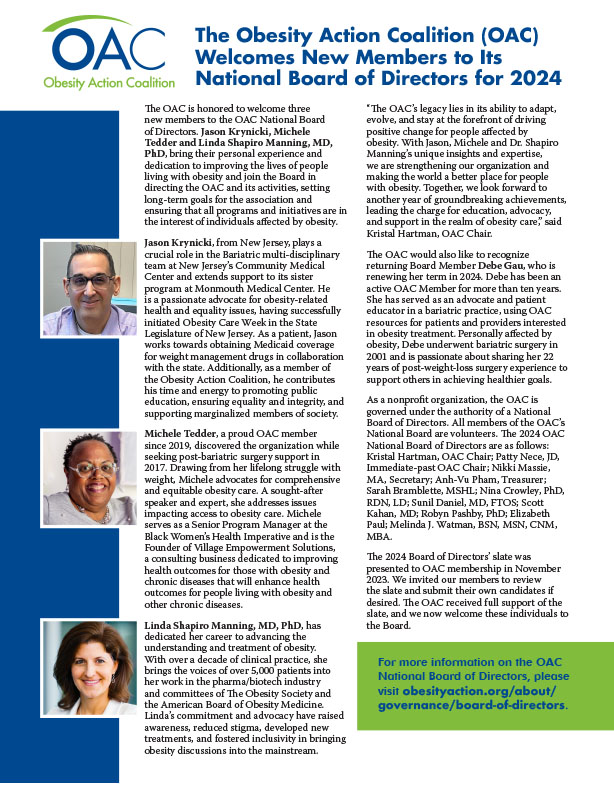A Challenge to the OAC Membership and Patient Advocate Community – An Open Letter

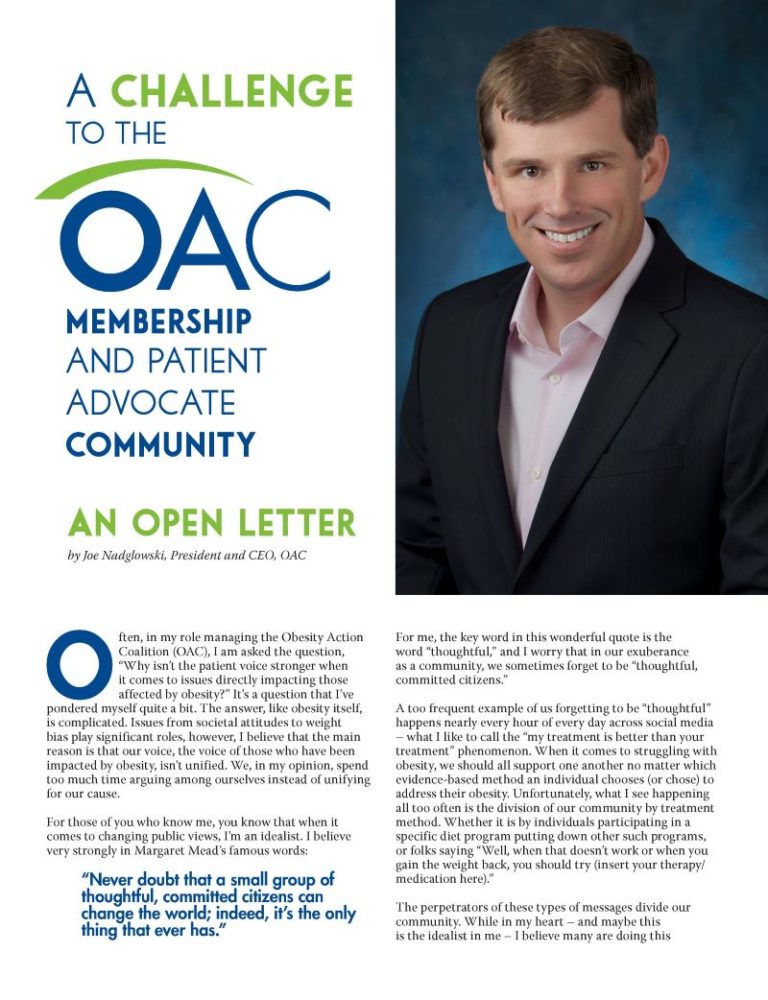
by Joe Nadglowski, President and CEO, OAC
Winter 2015
Often, in my role managing the Obesity Action Coalition (OAC), I am asked the question, “Why isn’t the patient voice stronger when it comes to issues directly impacting those affected by obesity?” It’s a question that I’ve pondered myself quite a bit. The answer, like obesity itself, is complicated. Issues from societal attitudes to weight bias play significant roles, however, I believe that the main reason is that our voice, the voice of those who have been impacted by obesity, isn’t unified. We, in my opinion, spend too much time arguing among ourselves instead of unifying for our cause.
For those of you who know me, you know that when it comes to changing public views, I’m an idealist. I believe very strongly in Margaret Mead’s famous words:
“Never doubt that a small group of thoughtful, committed citizens can change the world; indeed, it’s the only thing that ever has.”
For me, the key word in this wonderful quote is the word “thoughtful,” and I worry that in our exuberance as a community, we sometimes forget to be “thoughtful, committed citizens.”
A too frequent example of us forgetting to be “thoughtful” happens nearly every hour of every day across social media – what I like to call the “my treatment is better than your treatment” phenomenon. When it comes to struggling with obesity, we should all support one another no matter which evidence-based method an individual chooses (or chose) to address their obesity. Unfortunately, what I see happening all too often is the division of our community by treatment method. Whether it is by individuals participating in a specific diet program putting down other such programs, or folks saying “Well, when that doesn’t work or when you gain the weight back, you should try (insert your therapy/medication here).”
The perpetrators of these types of messages divide our community. While in my heart – and maybe this is the idealist in me – I believe many are doing this unintentionally in just being excited about their own therapy, I believe this is the most important barrier to our speaking with a stronger voice. Simply said, it is time to stop bashing other obesity therapies just because they are not right for you or didn’t work for you. Everyone’s fight to address their obesity is different. As such, it is important that we have a full toolbox of tools to address their obesity even if you would never consider using specific tools that are available.
This definitely doesn’t mean that I don’t think people should speak out against “snake oil,” miracle cures or other malarkey. It also doesn’t mean that I don’t believe in true and honest discussions about the pros and cons of certain therapies (OAC’s Understanding Your Weight Loss Options Brochure is a great example of an evidence-based pros and cons discussion). It simply means that I think we need to be more “thoughtful” when it comes to how we talk about and compare treatments for obesity, especially those that may not have been our choice or didn’t work for us. Just because the therapy didn’t work for you (and no matter the obesity therapy, there are people it didn’t work for), doesn’t mean that it won’t work for someone else. No treatment option is perfect for everyone in either the short or long-term, and the constant back and forth between folks arguing “my therapy is better than yours” serves no purpose but division.
With division, we lose the power we have with our numbers to make a meaningful difference. With division, we also create confusion among those trying to identify the right therapy for them. For those of you who have sought treatment for your obesity, you know the decision of balancing both the benefits and risks is not an easy one. It’s my opinion when we aren’t “thoughtful” in our public posts and discussions on therapy, it turns people away from seeking help in general. It’s a hard enough decision without all the additional noise and mixed messages one can see.
Being more “thoughtful” isn’t that difficult. In explaining why you chose a specific therapy over simply adding, “For me, therapy ‘xyz’ was or wasn’t the right choice,” makes a huge difference. If you are talking about a therapy that didn’t work for you, you can simply say “While therapy ‘xyz’ didn’t work for me, it may for others.” I’d also remind everyone that just because you have been successful with your current obesity treatment doesn’t mean you won’t need future treatments. I know this from personal experience that obesity is a life-long disease, and many of us will require multiple treatment types throughout our lifetime.
My challenge to each of you is to be more supportive of those who struggle with obesity no matter how they have chosen, or not chosen, to address their obesity. I know we can create a more powerful voice if we spend less time arguing about what therapy type is best and more time supporting each other in our quest for improved health no matter our treatment type. OAC has dedicated the better part of the last 10 years to improving the availability of and access to the treatments of obesity. We are so close to creating a world where when someone is ready to address their obesity, they have both the availability of and access to treatment. When our community becomes more “thoughtful” and unites together for the greater good, I wholeheartedly believe we will achieve that goal.
Together we can and do make a difference!
Joe Nadglowski
by Chrystal Jones, OAC Advocacy Manager Spring 2024 The Obesity Action Coalition (OAC) is the only patient-focused…
Read Articleby Ava Zebrick Spring 2024 Meet Ava Zebrick, a powerhouse within the Obesity Action Coalition (OAC) whose…
Read ArticleThe OAC is honored to welcome three new members to the OAC National Board of Directors. Jason Krynicki,…
Read Article




